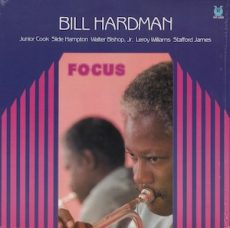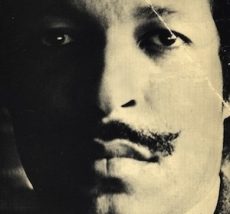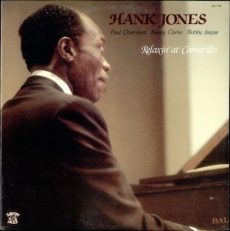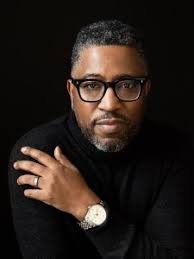
Jazz Poems
STARDUST
Lady singsthe blues
the reds, whatever
she can find—
short
changed, a chord—
God bless
the child
that’s got his own
& won’t mind
sharing some—
“BILLIES BOUNCE”
“BILLIES BOUNCE”
Miss Holiday’s up
on four counts
of possession, three-
fifths, the law
—locked up—
licked—the salt
the boot—refused
a chance to belt
tunes in the clubs—
ex-con. Man,
she got it
bad—Brother
can you spare
a dime
bag? MEANDERING
WARMING UP
A RIFF—
she’s all scat,
waxing—
SIDE A
SIDE B
OOH
SHOO DE
OBEE—
detoxec, thawed
in time
for Thanksgiving—live
as ammo, smoking
—NOV. 26 1945—
Day cold as turkey
KEVIN YOUNG
from Jazz Poems ~ Selected and Edited by Kevin Young
More Posts: book,classic,collectible,history,jazz,library,poet

Requisites
Focus ~ Bill Hardman | By Eddie Carter
This morning’s discussion is a terrific album by Bill Hardman. Focus (Muse Records MR 5259) is his fourth release as a leader, and a hidden gem in his catalog. Bill was born and raised in Cleveland, Ohio, where his jazz journey began playing with Tadd Dameron while in high school, and after graduating, with Tiny Bradshaw. His first recording with Jackie McLean in 1956 marked the beginning of a career that, although not widely known, earned deep respect in jazz circles for his exceptional trumpet and flugelhorn performances. On this album, Bill’s trumpet is joined by Slide Hampton on trombone (tracks: A2, A3, B1, B3), Junior Cook on tenor sax, Walter Bishop Jr. on piano, Mark Elf on guitar (B2), Stafford James on bass, and Leroy Williams on drums. My copy is the 1980 U.S. stereo release.
Side One is off to the races with Avila & Tequila by Hank Mobley. Leroy opens with a spirited introduction, accompanied by Walter and Stafford, setting the stage for the ensemble’s collective theme. Bill soars through the opening solo energetically. Junior’s following statement is brimming with dynamic energy. Walter maintains the vigorous momentum next, and Leroy charges the finale in a short workout, culminating in the theme’s reprise and fadeout. The sextet eases into the medium melody of Cubicle by Walter Bishop Jr. Bill gets into a good groove on the lead solo. Slide has an outstanding moment before Junior takes over to put his ideas into practice. Walter wraps it up before the restatement and exit.
Up next is Bill Lee’s Too Little, Too Late. The sextet’s medium-tempo introduction and melody start things off. Bill gets things going with a relaxing interpretation, then Slide moves with unhampered ease in the following solo. Junior jumps into a short, articulate statement next, and Walter wraps things up with a satisfying conclusion, preceding the closing chorus. The title tune, Focus by Tadd Dameron, changes the direction to begin the second side with the ensemble’s upbeat introduction and theme in unison. Slide steps up first to give a lively solo. Junior glides over the rhythm section with agility and skillful confidence next, then Bill attacks the following reading with virile lyricism. Walter continues conveying happy thoughts on the piano, and Stafford takes a short walk leading to the ending theme.
My One and Only Love by Robert Mellin and Guy Wood begins with Walter’s introduction, setting the mood for Bill’s tender melody with Junior shadowing him as it unfolds. Junior tells a touching story in the opening statement, then Mark delivers notes of great beauty in his only solo spotlight. Bill follows with a passionately haunting interpretation preceding his return to the gentle ending theme and soft climax. Minority by Basheer Qusim takes off like a race car with Leroy leading the sextet into a speedy melody. Bill goes to work first with a spirited solo, then Junior cooks at the right temperature. Slide infuses the following reading with riveting urgency. Walter builds the following statement exquisitely, and Leroy shines in a short workout before the melody’s restatement and finale.
Fred Seibert produced Focus, and the recording engineer was Fred Miller. The album is a joy to listen to, with a superb soundstage that brings the musicians to the sweet spot in your listening room with stunning fidelity. Bill Hardman recorded only five albums as a leader, but his discography as a sideman is extensive, including with Art Blakey and The Jazz Messengers, Lou Donaldson, Charles Mingus, and Horace Silver. He also co-led a group with Junior Cook but ultimately remained little known to the general public. He died on December 6, 1990, from a brain hemorrhage at age fifty-seven. If you’re a hard bop fan, I invite you to check out Focus by Bill Hardman on your next vinyl hunt. It’ll reward you with many hours of listening pleasure, especially if you’re a fan of jazz trumpet!
~ Jackie’s Pal (Prestige PRLP 7068) – Source: Discogs.com
~My One and Only Love – Source: JazzStandards.com
© 2025 by Edward Thomas Carter
More Posts: choice,classic,collectible,collector,flugelhorn,history,instrumental,jazz,music,trumpet

Jazz Poems
GYRE’S GALAX
Sound variegated through beneath lit
Sound variegated through beneath lit through sound beneath variegated lit sound variegated through beneath litVariegated sound through beneath lit dark
Variegated sound through beneath lit dark sound variegated through beneath lit variegated sound through beneath lit darkThrough variegated beneath sound lit
Through variegated beneath sound lit through variegated beneath sound lit through variegated beneath sound lit Through variegated beneath sound lit Through variegated beneath sound lit through beneath lit through beneath lit through beneath lit through beneath lit Thru beneath Thru beneath Thru beneath through beneath lit Thru beneath through beneath lit Thru beneath through beneath lit Thru beneath Thru beneath through beneath lit Thru beneath Thru beneath through beneath lit Thru beneath Thru beneath Thru beneath Thru beneath Thru beneath Thru beneath Thru beneath Through beneath litTwainly simple of amongst
twainly simple of amongst Twainly simple of amongst twainly simple of amongst Twainly simple of amongst twainly simple of amongst In lit black viewly viewly viewly in viewly viewly viewly in viewly viewly in viewly viewly in viewly viewly viewly viewly in viewly viewly In lit black viewly in dark to stark In dark to stark In dark to stark in dark to stark In dark to stark in dark to stark In dark to stark In above beneath In above beneath In above beneath above beneath lit above beneath above beneath above beneath above beneath lit above beneath above beneath lit above beneath above beneath lit above beneath above beneath lit above beneath above beneath above beneath above beneath above beneath lit above beneath above beneath above beneath lit above beneath above beneath above beneath above beneath above beneath above beneath above beneath above beneath above beneath litN. H. PRITCHARD
from Jazz Poems ~ Selected and Edited by Kevin Young
More Posts: book,classic,collectible,history,jazz,library,poet

Requisites
Relaxin’ at Camarillo ~ Hank Jones | By Eddie Carter
Have you ever found yourself planning to listen to a specific album in your library, only to be drawn to another title on the shelf? That’s precisely what happened to me, and it ultimately led to a delightful surprise and this morning’s discussion. Hank Jones has been one of my favorite pianists since I first heard him on Bass on Top, New Trombone, Portrait of Art Farmer, and Somethin’ Else many years ago. Relaxin’ at Camarillo (Savoy Jazz WL 70504) was initially released in 1956 as the Hank Jones Quartet, and this gem is often overlooked within his extensive discography. Accompanying Hank in this session are Bobby Jaspar on flute, Paul Chambers on bass, and Kenny Clarke on drums. My copy is the 1984 U.S. mono reissue.
The album opener is the lovely forties tune Moonlight Becomes You by Jimmy Van Heusen and Johnny Burke. A brief piano introduction sets up Bobby’s gentle melody, with the trio in tow. Hank begins the solos with notes of beautiful simplicity. Bobby takes over to deliver the second statement effortlessly, then comes Paul’s elegantly subtle closer before the melody returns and ends softly. The title track, Relaxin’ at Camarillo by Charlie Parker, elevates the pace for the foursome’s mid-tempo theme. Jaspar takes flight first in a spirited presentation of rhythmic energy. Chambers then walks skillfully through the following solo, and Jones vigorously tackles the third reading. All three soloists repeat this sequence several times until the theme’s reprise ends abruptly.
Side Two begins with Minor Contention by Hank Jones. The pianist’s introduction ushers in the foursome’s upbeat melody. Bobby leads the charge, building each chorus with irresistible momentum. Hank surges into the following interpretation with a vibrant energy. Paul takes a jaunty walk through the third performance, and finally, Bobby, Hank, and Kenny conclude with an exhilarating three-way dialogue, culminating in a splendid finale. The quartet enjoys a pretty Sunday in Savannah by Hugh McKay next. Hank’s slow-paced introduction blossoms into Jaspar’s tenderly passionate melody. Jones opens with a delicately thoughtful presentation, and then the flutist provides a sultry commentary preceding a gentle conclusion.
The beat ascends one final time for an original by Cannonball Adderley, Spontaneous Combustion. Bobby’s introduction opens the door for the quartet’s blues-infused theme. Hank dives into the leisurely opening solo with relaxing lines. Bobby follows with a refreshing statement reminiscent of a cool swim on a sweltering summer day. Jaspar and Jones share a delightful exchange of notes, leading to Paul’s pleasant moment ahead of the climax. Ozzie Cadena produced the initial session, while Bob Porter oversaw the reissue’s production. Rudy Van Gelder operated the recording dials. The album boasts a stunning soundstage for a fifties release, with instruments that jump out of the speakers in this mono reissue.
Throughout his illustrious career, which spanned sixty-six years, Hank Jones recorded over sixty albums as a leader. He was also a prominent member of the Great Jazz Trio, contributing to thirty-eight albums and an additional seven titles with the Great Jazz Quartet and Quintet. His extensive discography also includes numerous appearances as a sideman. If you’re a piano jazz enthusiast and also enjoy cool jazz and hard bop, Relaxin’ at Camarillo by Hank Jones is an exceptional choice for a spot in your library. As I mentioned earlier, it’s a delightful surprise with the addition of Bobby Jaspar to the trio, making this a title that shouldn’t be missed on your next record-shopping trip!
~ Bass on Top (Blue Note BLP 1569/BST 81569), Hank Jones Quartet (Savoy MG-12087), New Trombone (Prestige PRLP 7107), Portrait of Art Farmer (Contemporary Records C3554/S7027), Somethin’ Else (Blue Note BLP 1595/BST 81595) – Source: Discogs.com
~ Moonlight Becomes You – Source: Wikipedia.org
© 2025 by Edward Thomas Carter
More Posts: choice,classic,collectible,collector,history,instrumental,jazz,music,piano

Jazz Poems
LEAVING SATURN
Sun Ra & His Year 2000 Myth Science
Arkestra at Grendel’s Lair Cabaret, 1986
Skyrocketed—
My eyes dilate old
Copper pennies.
Effortlessly, I play
*
Manifesto of the One
Stringed Harp. Only
This time I’m washed
Ashore, shipwrecked
*
In Birmingham.
My black porcelain
Fingers, my sole
Possession. So I
*
Hammer out
Equations for
A New Thing
Ogommetelli.
*
Ovid & Homer
Behind me, I toss
Apple peelings in
The air & half-hear
*
Brush strokes,the up
Kick of autumn
Leaves, the Arkestra
Laying down for
*
New dimensions,
I could be at Berkeley
Teaching a course—
Fixin’s How to Dress
*
Myth or Generations
Spaceships in Harlem
Instead, vibes from Chi-
Town, must be Fletcher’s
*
Big Band Music—oh,
My brother, the wind—
I know this life is
Only a circus. I’m
*
Brushed aside: a naïf,
A charlatan, too avant-
Garde. Satellite music for
A futuristic tent, says
*
One critic. Heartbreak
In outer space, says
Another, —lunar
Dust on the brain.
*
I head to New York
New York loves
A spectacle wet pain
Of cement, sweet
*
Scent of gulls swirling
Between skyscrapers
So tall, looks like war
If what I’m told is true
*
Mars is dying, it’s after
The end of the world.
So, here I am,
In Philadelphia,
*
Death’s headquarters,
Here to save the cosmos,
Here to dance in a bed
Of living gravestones.
MAJOR JACKSON
from Jazz Poems ~ Selected and Edited by Kevin Young
More Posts: book,classic,collectible,history,jazz,library,poet



